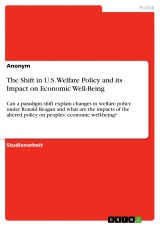Details

The Shift in U.S. Welfare Policy and its Impact on Economic Well-Being
Can a paradigm shift explain changes in welfare policy under Ronald Reagan and what are the impacts of the altered policy on peoples' economic well-being?1. Auflage
|
13,99 € |
|
| Verlag: | Grin Verlag |
| Format: | |
| Veröffentl.: | 19.02.2020 |
| ISBN/EAN: | 9783346116741 |
| Sprache: | deutsch |
| Anzahl Seiten: | 21 |
Dieses eBook erhalten Sie ohne Kopierschutz.
Beschreibungen
Studienarbeit aus dem Jahr 2018 im Fachbereich Politik - Region: USA, Note: 1.0, Universität zu Köln (Cologne Center for Comparative Politics), Veranstaltung: Political Economy of the USA, Sprache: Deutsch, Abstract: The question arising for this research is the following: Can a paradigm shift explain changes in U.S. welfare policy under Reagan and did the altered policy have an impact on the economic well-being of its citizens? In order to answer these questions, this paper is divided into five sections. The first section presents Peter Hall’s approach of social learning, which serves as theoretical framework for this paper and indicates that a paradigm shift occurs through three different stages. Secondly, the method and data used in this paper will be discussed. The analysis, forming the fourth section, first establishes that indeed a paradigm shift happened by descriptively analyzing that the shift towards a new welfare consensus is detectable in all levels of social learning. Through the second part of the analysis, which evaluates the impact of the paradigm shift on the citizens’ economic well-being, it becomes obvious that no improvement happened during the Reagan presidency. Within the fifth sections the results will be summarized and discussed. The last section briefly considers the legacy Reagan bequeathed and points out the limitations of this paper.
Since the 1970s, the welfare state faced mounting challenges. Moreover, the election of Ronald Reagan as new President of the U.S.A. marks a turning point in the history of the U.S. welfare. Reagan challenged the established welfare state consensus, arguing that the nation’s economic well-being would be promoted more effectively by retrenching and reorganizing the social welfare state. Under the Reagan Administration (1981-89) welfare policy was altered and brought into focus by new viewpoints on its purpose, encompassing a political call for more self-responsibility and less state regulation. A possible explanation for the changes could be the development of a new policy paradigm aiming to replace the existing one due to certain, mainly economical, reasons, also referred to as paradigm shift. Such a paradigm shift in the policy of a welfare state could alter the economic well-being of its citizen as it incorporates a change of self-perception of the state that it is no longer primary responsible for deliberately modifying the natural course of market forces through the provision of social services and financial assistance.
Since the 1970s, the welfare state faced mounting challenges. Moreover, the election of Ronald Reagan as new President of the U.S.A. marks a turning point in the history of the U.S. welfare. Reagan challenged the established welfare state consensus, arguing that the nation’s economic well-being would be promoted more effectively by retrenching and reorganizing the social welfare state. Under the Reagan Administration (1981-89) welfare policy was altered and brought into focus by new viewpoints on its purpose, encompassing a political call for more self-responsibility and less state regulation. A possible explanation for the changes could be the development of a new policy paradigm aiming to replace the existing one due to certain, mainly economical, reasons, also referred to as paradigm shift. Such a paradigm shift in the policy of a welfare state could alter the economic well-being of its citizen as it incorporates a change of self-perception of the state that it is no longer primary responsible for deliberately modifying the natural course of market forces through the provision of social services and financial assistance.
Diese Produkte könnten Sie auch interessieren:

How Insights from Moral Psychology and Character Research can aid Development Cooperation

von: Jan Prothmann

13,99 €















